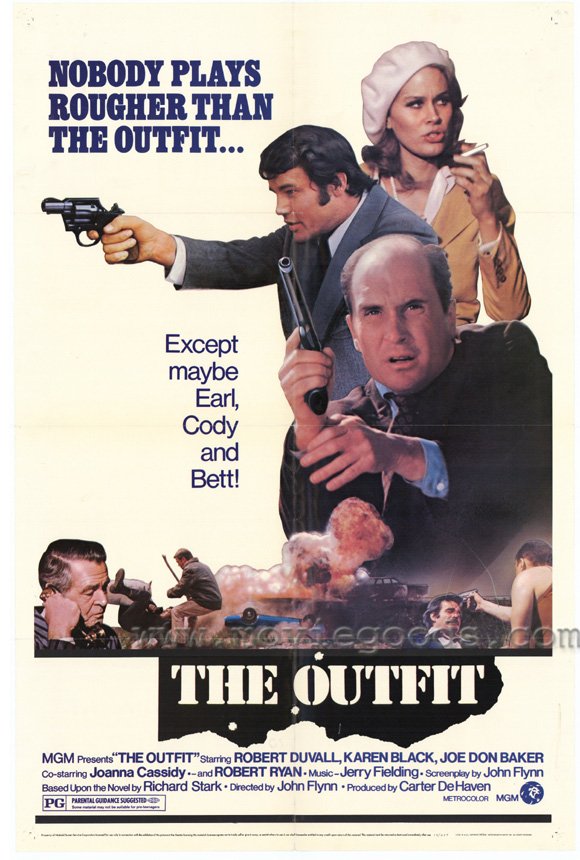
This is the second in a series of fifteen planned reviews of the films of John Flynn. During his 33-year career, Flynn directed everything from intimate character studies of volatile, potentially violent men to dark revenge films to early Steven Seagal vehicles and everything in between. Utilizing a spare style of filming that subscribed to the idea that the audience should not be aware of the director, Flynn placed an emphasis on strong performances and cleanly shot and edited action sequences that showcased impressive stunt work. His films show how a director with a clear vision can elevate even the most generic potboiler into a sturdy genre film worthy of rediscovery, yet most film buffs do not know his name.

Late in the third act of THE OUTFIT, Cody (Joe Don Baker), one of the two hard-boiled criminals at the center of the film, says “The good guys always win.” He and his partner, Earl Macklin (Robert Duvall), bust out laughing uproariously, not because the line is funny, but because they know there are no such things as “good guys” in their world. They travel in criminal circles that operate in varying shades of dark grey at best. Cody’s joke is a good summation of the film’s themes of honor and dishonor among thieves. That casual acknowledgement of the film’s bleakness also explains why it is one of the better adaptations of the “Parker” novels by Donald E. Westlake (written under the pseudonym of Richard Stark).

The character of Parker—an efficient, cold-blooded thief and murderer with his own code of conduct—has been brought to the screen several times with varying results: POINT BLANK found Parker rechristened as Walker and played by Lee Marvin; Jim Brown portrayed him as McClain in THE SPLIT; Brian Helgeland’s compromised crime drama PAYBACK changed the character’s name to Porter and coasted on the star power of Mel Gibson; strangely, the only time that I’m aware of that the character has made it to the screen with his literary name intact is in Taylor Hackford’s goofy, but entertaining PARKER, played by Jason Statham. There have been other adaptations and actors, but I don’t want this to turn into an exhaustive list. That small sampling I’ve listed is a fairly impressive roster of badass action stars. Duvall earns his place on that roster with his own tough-as-nails, effortlessly cruel take on the character.
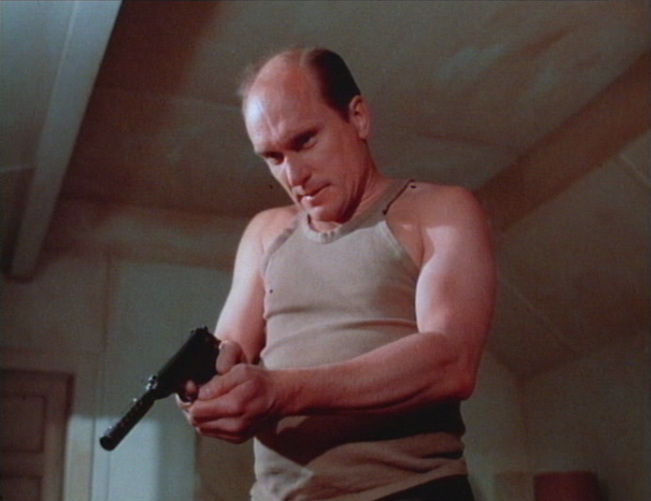
A pre-credits sequence quickly establishes the film’s dark tone. Two hitmen silently drive to a remote home. Gray clouds obscure the sun as the killers gun down a seemingly benign man in his backyard. Tipped off to the approach of the gunmen, a woman makes a desperate phone call, but Flynn cuts to the bullet-riddled corpse of the man as his phone rings in the background. The build is suspenseful but swift, the violence harsh and meted out with no dialogue.

It turns out the man was Ed Macklin, Earl’s brother. Ed’s murder was timed to coincide with Earl’s release from prison. When Earl gets the drop on his own would-be assassin, he slugs and shoots his way up a criminal chain of command to find out who killed his brother and why they want to do the same to him.

It turns out that Earl, Ed, and their former partner Cody robbed a bank in Wichita that was laundering money for a criminal syndicate known as “The Outfit.” If there is one thing we have learned from movies, TV shows, and novels about the mob, they don’t like to be robbed, even if the robbers didn’t know they were stealing from an organized crime front. As far as Mailer (Robert Ryan), the head of The Outfit, is concerned, ignorance is no excuse and he needs to kill Earl and Cody to make an example of them.
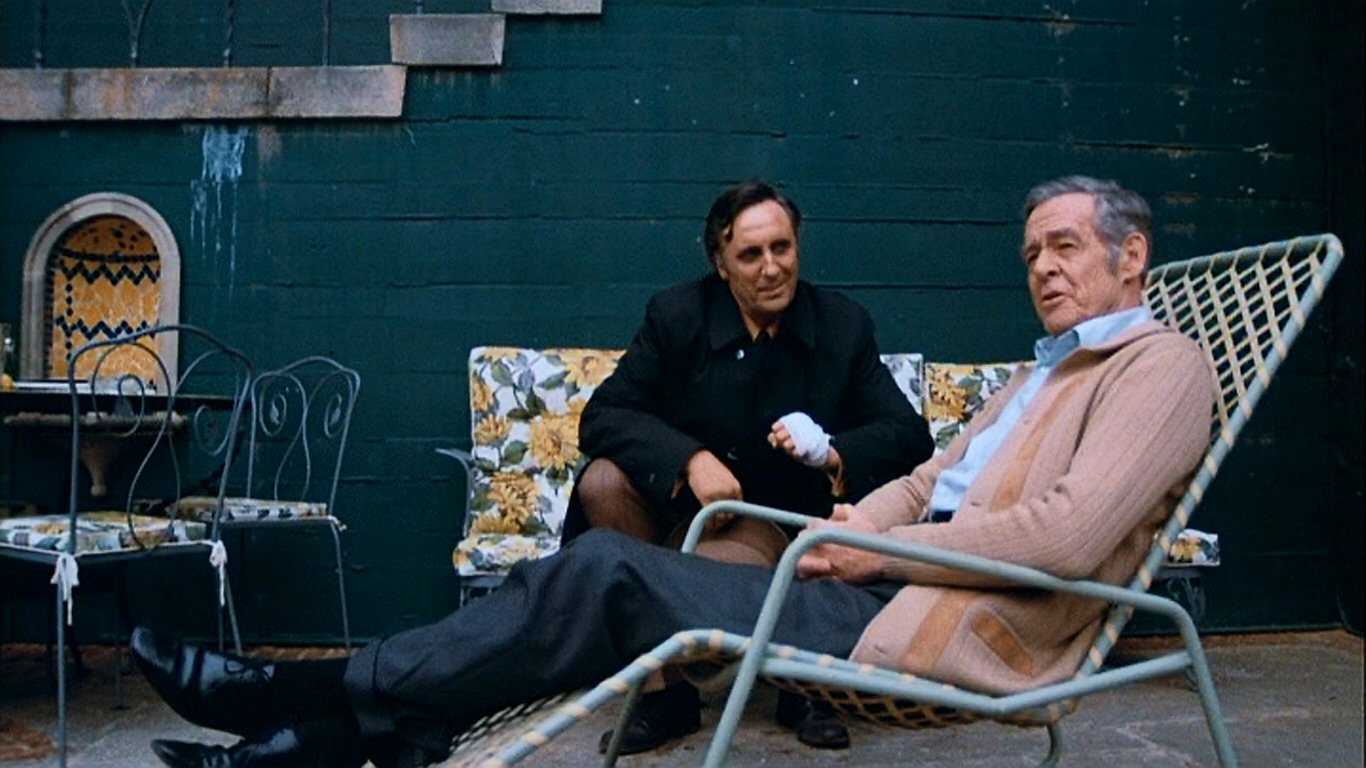
Earl and Cody—along with Earl’s put-upon girlfriend, Bett (Karen Black)—team up to take the fight to The Outfit by ripping off their operations left and right until Mailer calls off the order to kill them. While they’re at it, Earl and Cody consider it more than reasonable that they receive $250,000 for their troubles and as compensation for Ed’s murder. Considering the seemingly endless resources of money and men available to Mailer, Earl’s plan is somewhere between audacious and suicidal.

THE OUTFIT is the only feature screenplay credited to Flynn in his career (he is credited with writing LONE STAR, a pilot that was not picked up for series). He largely keeps the dialogue as sparse as his shooting style, staying true to the idea of these characters as men of action and few words. What dialogue there is tends to be of the hard-boiled, pulpy variety that would sound silly coming out of the mouths of anyone other than established screen tough guys like Duvall, Baker, and Ryan. But these are actors who specialized in playing macho, testosterone-driven men through their careers. They bring a sense of authenticity to the stylized script, taking the film into territory that might have been bleaker than even Flynn expected when he wrote the script.
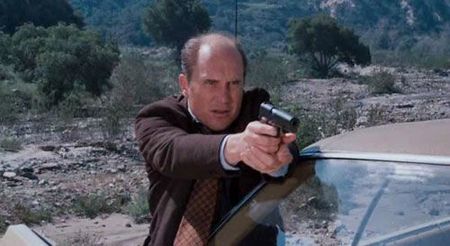
The minimalist aesthetic also applies to the action scenes in the film. As he did throughout his career, Flynn presents the action scenes fluidly. The camera placement and blocking of the actors within the frame always makes it easy to follow who is doing what where. This clarity of movement and smooth editing makes the abrupt action beats exciting and even give the illusion of realism to a borderline-ridiculous third act action set piece.

Unfortunately, many of Flynn’s films are so focused on their male characters, they largely ignore any female characters that happen to be present. If that were the case with THE OUTFIT, it would have been easier to handle than the way Bett and the other female characters are treated.

Bett is set up as a wild card in the film’s early scenes. She’s waiting for Earl when he gets out of prison, but is quickly revealed to have had a hand in setting him up for the botched assassination attempt. Earl forgives her when he hears her story of torture and sees several cigarette burns on her arm. She could be seen as a potential traitor throughout the film or as Earl’s loyal girlfriend, helping him get revenge. Instead, Flynn treats her as a weak victim, used by the man she loves, disowned by her family, and powerless to stop Earl’s escalating violence. Black tries to give Bett some spark of life and she is heartbreaking in a scene where she talks to her father on the phone, but the character is largely a collection of victim clichés. The other women in the film serve as nothing more than plot points or fill in as archetypes (at best), from Mailer’s young trophy wife (a wasted Joanna Cassidy) to the troublemaking wife (Sheree North) of a criminal who falsely accuses Cody of raping her. Only Jane Greer as Ed’s girlfriend seems to be playing an actual character as she mourns her lover and alternately scolds/warns Earl about the dangers of his drive for vengeance. She is both steely and sympathetic and brings the weight of her long screen career to her performance, leaving a strong impression on the film in two short scenes.
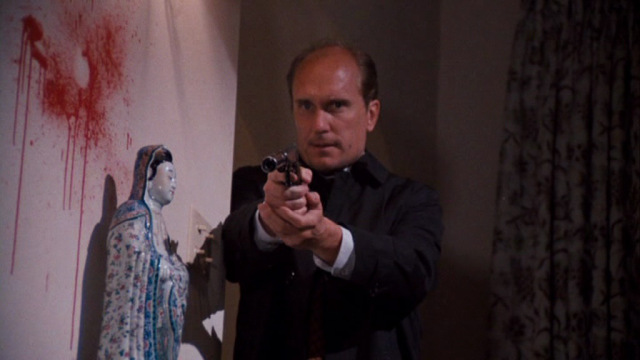
Duvall turns in a very good performance, never asking for audience sympathy and largely never getting it. Earl is a tricky role because he is neither hero nor antihero nor villain. He is simply a bad guy going up against some (arguably) worse guys. He is driven by greed and a thirst for vengeance, killing and beating up a lot of people along the way. It could be argued that his commitment to his lifestyle makes him admirable in that he is true to himself. But that still does not dismiss all the bad things he does in the film and—presumably—in his life leading up to the point where the film introduces him. Duvall commits to the viciousness of the character. By the end of the film, he has inhabited Earl so naturally that he is frightening.

Baker is equally as impressive as Cody. 1973 was a good year for Baker, between THE OUTFIT, CHARLEY VARRICK, and WALKING TALL. His performance as Cody is easily the best of the bunch. While Flynn takes full advantage of Baker’s intimidating presence, he also draws a nuanced turn out of the actor that is beyond what was usually asked of him. Whether he is pondering the near-certain mortality that comes with his line of work in one of the film’s few monologues, or just shown nervously smoking a cigarette before a raid on one of The Outfit’s operations, Baker digs deeper than he probably should and gives Cody at least a glimmer of a remorseful soul.
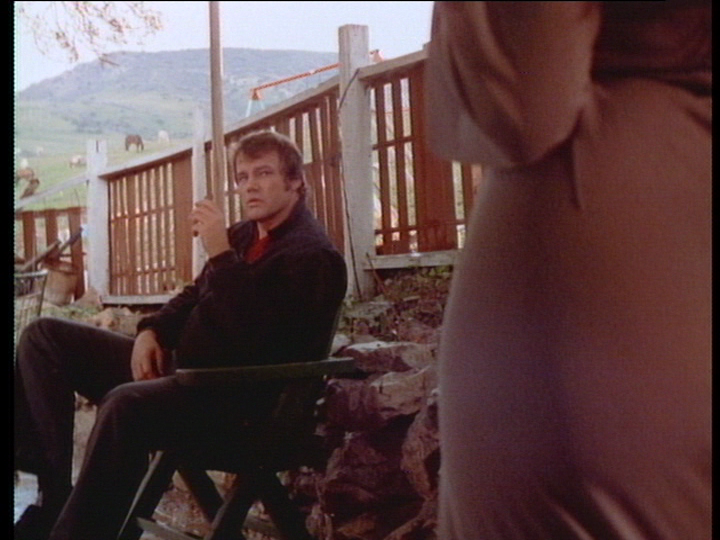
And of course, there is the legendary Robert Ryan.
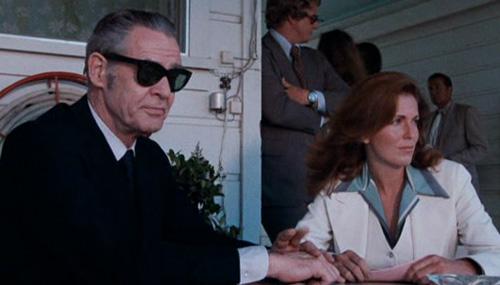
Ryan was dying of lung cancer at the time he made the film and he certainly looks older and frailer than his 63 years, but he still cuts an imposing figure. Given Mailer’s limited screen time, Flynn needed an actor known for his villainous turns and he got one of the best in Ryan. In actuality, Ryan is quiet and low-key in his performance, but he carries with him the baggage of the psychotic, nearly feral killers he played in films like THE NAKED SPUR, HOUSE OF BAMBOO, and THE WILD BUNCH. Because of this, the audience keeps waiting for him to snap. His mere presence makes Mailer seem more threatening to Earl, Cody, and Bett than the sheer number of killers he can throw at them.

Flynn rounds out the cast with a series of great character actors. In what should have been throwaway roles, performers like Elisha Cook Jr., Timothy Carey, Richard Jaeckel, and Marie Windsor give a sense of history to the people they are playing just by showing up. Along with Ryan, their presence allows Flynn to connect THE OUTFIT back to the hard-boiled crime films of the ‘40s and 50’s.
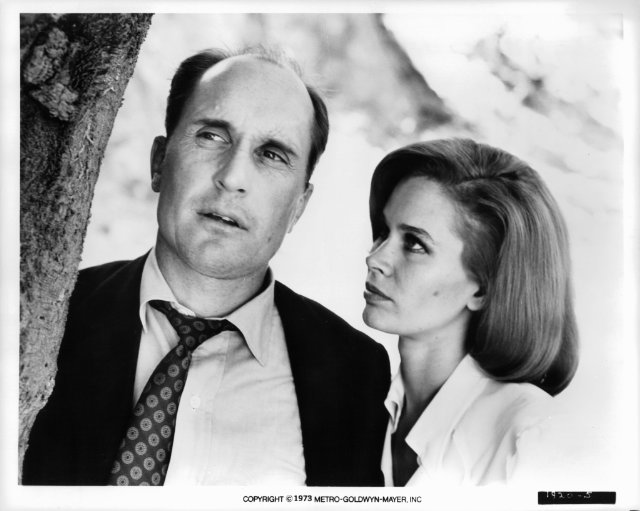
Despite my issues with the way it treats its female characters and a third act that threatens to go off the rails before righting itself, THE OUTFIT is a mean, quickly-paced thriller. It is neither the most violent nor cynical film Flynn would make in his career, but it still packs a surprising jolt into its story of bad guys and bad guys.
— MATT WEDGE.
To read the first installment of the series, featuring John Flynn’s film THE SERGEANT, click here.
And for an alternate look at THE OUTFIT, click here.
Tags: Crime, Elisha Cook Jr., Film Reviews, Jane Greer, Jerry Fielding, Joanna Cassidy, joe don baker, john flynn, karen black, Marie Windsor, Richard Jaeckel, Richard Stark, robert duvall, Robert Ryan, Sheree North, Timothy Carey

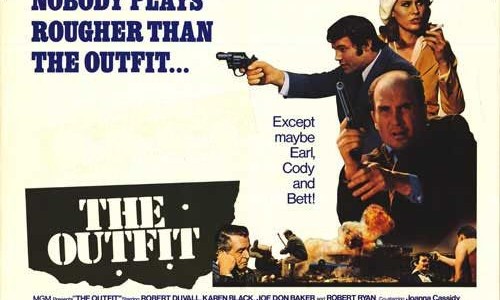
No Comments